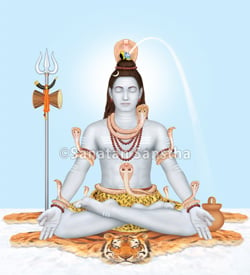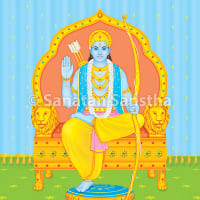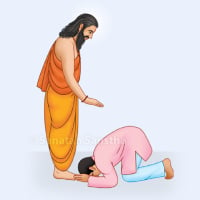
1. The meaning of the word ‘Shiva’
The meaning of the word ‘Shiva’ is ‘Sacred and benevolent’.
2. Why is it necessary to offer prayers to Shiva ?
Deities in Hindu Dharma give energy to enable every person to enjoy Bliss and peace in life; but for that we have to offer prayers to them. Prayers is an easy and simple means to please Deities. Deity Shiva also graces the devotee when prayers are offered to Him.
3. Shiva’s prevalent names and their implied meanings
A. Mahadev : Shiva is full of purity and knowledge. That is why we call Him ‘Mahadev’. Friends, if we worship such Mahadev, then we too can be paripurna (Complete in all senses).
B. Trinetra : Shiva is also called ‘Trinetra’. The one who can see all incidents of the past, present and future, is known as ‘Trinetra’.
C. Karpurgaur : Shiva’s colour is white, like camphor; hence He is called ‘Karpurgaur’.
4. Distinguishing features of the Chandrakor
on the forehead of Shiva, so also Vyaghrambar (Tiger-skin worn as clothing)
A. Distinguishing feature of the Chandrakor and qualities connected to it
There is a Chandrakor (crescent moon) on the forehead of Deity Shiva. This Chandrakor shows qualities like Mamata (Love), Kshamashilata (Forgiveness) and Vatsalya (Affection). Analysis of these qualities is given ahead.
1. Mamata : Mamata means love. We should have a lot of love for others. Presently children beat one another and behave rudely. They make fun of one another. Is this love ? No. We should be very loving to all. We should render a helping hand to everyone. We should be humble while talking to elders or younger ones. If we practise this, then Shiva will always shower His grace on us.
2. Kshamashilata (Forgiveness) : To err is human. So if a friend commits any mistake, we should pardon him. Nowadays, small children lose patience immediately and get ready to fight for simple reasons. The one who has a forgiving nature, accepts his own mistake and tries to improve himself. Such a child is graced by Shiva very quickly. All of us should strive for that.
3. Vatsalya : Vatsalya represents motherly love. This is Shiva’s quality and we should try to imbibe it in ourselves. We love our close friend very much; but not others. Shiva does not have this discrimination. He loves all equally.
B. Vyaghrambar (Tiger-skin worn as clothing)
Tiger is a symbol of cruelty. The cruel tiger was killed by Shiva and He used that skin as his a seat. Children, our personality defects make us cruel. These qualities take us far away from bliss and ideal life. We have to eradicate our personality defects in order to make our life Blissful.
5. Distinguishing spiritual features of Shiva
A. Mahatapaswi and Mahayogi
Shiva is ever occupied in chanting. Shiva is the only deity engrossed in meditation and sitting at one place. If we wish to be close to God or wish to become like God, then we should chant His Name consistently. If we chant, then our personality defects will get eradicated and we too will be Blissful; but we need to try to chant consistently for that. Some children use abusive words for one another, they tease others. This is not good. If we chant continuously then our speech will be sweet and humble which will make us dearer to others. Let us all take a vow to start chanting on the occasion of mahashivratri.
B. Ever ready to bear any trouble for others
The poison, which was the outcome of the churning of the ocean (Samudramanthan) by Gods and demons, was burning the whole universe. None of the Gods was ready to accept that poison. At that time Deity Shiva drank that poison and digested it also. Otherwise the universe would have perished. By drinking the poison, Shiva saved the universe from destruction.
1. If children become broadminded to have a thought of ‘Bearing hardships for others’, then only all problems will be solved and the Nation and the society will be happy thereby getting blessed by Shiva : Shiva is ready to bear any hardship for others. We also should sacrifice everything for the benefit of others and the Nation. What picture do we see in society today ? Every person is behaving selfishly considering his own family and himself. Nobody thinks of the nation and society. Attitude to trouble others is increasing in society instead of bearing troubles for others. In schools also children beat, threaten other children. Will Shiva ever grace them ? If children become broadminded to have a thought of ‘Bearing hardships for others’, then only all the problems will get solved making the Nation and the society happy. Chhatrapati Shivaji Maharaj had to bear a lot of hardships for establishing swarajya; because he had the attitude to bear any hardship for others. This is real sacrifice.
Children should pledge on the occasion of Shivaratri, ‘I will not do anything that will cause harm to others.’ Let us pray at the feet of Shiva, ‘O, Mahadev, please pardon me if I have behaved or said something that has hurt anyone so far. From the day of this Shivaratri, please give me strength and intellect to bear any trouble for the benefit of others and the nation.’
C. Irascible
Any one disturbing Shiva in meditation, getting burnt to ashes due to energy created by chanting : We have a misconception that Shiva is irascible; but it is not really so. You must have heard that, ‘When Shiva opens His third eye everything gets burnt.’ Will the Deity that digested poison for others ever do like this? Never. Shiva chants eternally. He is always in a state of meditation. Owing to continuous chanting, a lot of energy is developed. When any one disturbs Him while He is meditating, He opens His 3rd eye and as a result, everything in front of Him at that time gets burnt due to the energy that was developed through chanting. However, if He Himself comes out of His meditation, then nothing happens; because He controls that energy.
D. Easy to please with devotion
If we all offer prayers to Him with bhav (Spiritual emotion) and chant His Name, then Shiva will be pleased with us. Hence let us be more and more devoted to Him.
E. Master of ghosts
Shiva is the master of ghosts. Deities are subtle and in the form of Air element. Evil energies (Ghosts) too exist like that. Some children suffer from distresses like fear, getting bad dreams in sleep etc. Evil energies move about during night time. Shiva is the master of evil energies. If we chant Shiva’s Name at night for 5 minutes every day before going to bed, then we will not get dreams. We give a call to God when we chant. All should chant for 5 minutes every night before going to sleep. If we give a call to the only master, then His servants, that is, evil energies will not have any power to trouble us.
6. Mission of Shiva
A. Governing the mission of the universe (Creation, Sustenance and Destruction)
Children, Shiv-Parvati are known as the parents of the universe. After the universe gets destroyed, Shiva provides energy for new Creation. In Bharatiya culture we use expressions like, ‘Matrudevo bhav’ and ‘Pitrudevo bhav’. Our parents are equal to God for us. God only looks after us through them. Children, think for a while, does our behaviour related to our parents suit the bhav that ‘our parents are equal to God’ ?. Do we offer obeisance to them ? Let us try from today to consider our parents as a form of Shiva and Parvati and act according to that bhav.
7. Nataraj
A. Dance is a means of devotion to God
Shiva has two forms. One form is always in meditation (Samadhirupa) and the other in a dance form (Nrutyarupa). His Samadhirupa is Nirgun (Non-materialised form), whereas, Nrutyarupa is Sagun (Materialsed form). We call Shiva ‘Natraj’ because He has gifted us the art of Dance. According to our culture, dance is a means of devotion to God. We get energy of Deities due to dancing. The one who sees and the one who dances, gets Bliss and peace.
B. Staying away from obscene dance, is the real devotion to Shiva
Today we are following westerners blindly. We are making the society and ourselves unhappy by doing western dances like ‘Pop’ and ‘Remix’. These western dances are an insult to Shiva. We will be cursed by Shiva if we present such disgusting dances. Let us resolve today that, ’I will never dance in the western style and if anyone is doing so then I will explain to them its drawbacks.’ By doing so we will be graced by Shiva and that is the real devotion to Shiva.
8. Physical features
A. Damaru (An hourglass shaped drum associated with Deity Shiva)
Shiva carries damaru in one hand. Universe was created through the sound of the damaru. So also the basic sounds of the 52 letters (Marathi alphabets) were created through that only.
B. Trishul (A trident; three-spiked weapon, associated with Deity Shiva)
Trishul symbolises the three states Utpatti, Sthiti and Laya. ‘Utpatti’ means creation, ‘Sthiti’ means to keep steady and ‘Laya’ means destruction. Each thing has to undergo these three stages. For example, we are born means Utpatti, thereafter, we live for some years which is called ‘Sthiti’ and finally we die meaning ‘Laya’.
C. Parashu (Axe)
Parashu symbolises destruction of ignorance. This leads to Bliss.
9. Method of worshipping Deity Shiva
A. Applying bhasma (Holy ash)
Devotees of Shiva apply three stripes of bhasma on their forehead. These three stripes symbolise Dnyan (Spiritual knowledge), Pavitrya (Holiness) and Upasana (Worship). They are also called ‘Shiva’s three eyes’.
B. Wearing a Japmala (Chanting beads) of rudraksha (Seeds obtained from the rudraksha tree found in the Himalayas, associated with Deity Shiva)
Rudraksha mala should be worn while worshipping Shiva. Rudraksh is formed by two words, i.e. ru + aksha. (ru + aksha, means the one who can see everything and do everything (Example, Third eye of Shiv). Aksha means axle. Eye moves around one aksha only; hence it is also called aksha. Rudraksha transforms waves of light of Gods in the universe into sound waves in the human body and transforms the sound waves into waves of light. That is why human being can accept Gods’ waves and thoughts of human being are transformed into language of Gods. Thus, rudraksha acts as an interpreter.
C. Offering tridal (Trifoliate) bel leaf to Shiv
We offer tridal to Shiva to get the experience going beyond virginity, youth and old age that, ’I am a blissful soul only’. Tridal also symbolises offering of trigunas namely Sattva, Raja and Tama, to Shiva.
10. How to worship Shiva ?
A. Method of offering bilva patra (Bel leaves) to Shiva
While offering bilva patra on Shiva- pindi (Deity Shiva’s sacred symbol), it should be upside down and the stem should point towards the worshipper. By offering bel in this way, more Energy of Shiva is transmitted through it and the worshipper who is offering that bel leaf is benefitted.
B. Flowers
Nishigandha, Jai, Jui, and Mogara are offered to Shiv in multiples of ten.
C. Incense stick
Two Incense sticks having fragrance of Kevada (Screwpine), Chameli or Heena should be waved around Shiv.
D. Fragrance (Attar)
Kevada fragrance is used in Shiva worship.
E. Pradakshina (Circumambulation)
Pradakshina around Shiva-pindi should be semicircular.
Children, in this article, we have learnt why and how to worship Shiva, which are the things necessary for His worship ? All should have scientific information about deities in Hindu Dharma; because by knowing the information only we can enhance our bhav and faith in God. We can develop love for God and we worship Him properly.
Shri. Rajendra Pavaskar Guruji, Panvel.

 Gudi Padva
Gudi Padva Ram Navami
Ram Navami Vatapournima
Vatapournima Nagpanchami
Nagpanchami Importance of the Guru in our life
Importance of the Guru in our life Student Teacher Relationship
Student Teacher Relationship